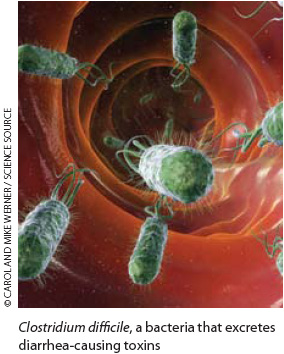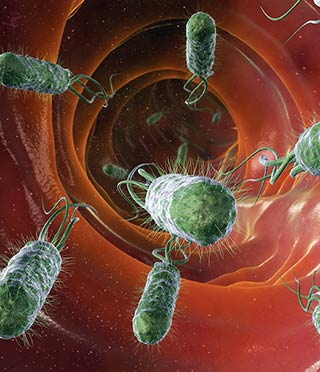Cancer treatment-related disruptions of normal gastrointestinal function are a common clinical challenge and usually include constipation or diarrhea.1,2 Treatment-related diarrhea can lead to patient dehydration and nutritional and electrolyte imbalances and hypokalemia; rapid dehydration can lead to shock.1,3 In severe cases, reductions in therapeutic radiation doses or even the discontinuation of radiotherapy are necessary.1,3 Untreated, severe cases of treatment-related diarrhea can be fatal.1,3
 Radiation therapy-associated diarrhea is the most common acute toxicity among patients undergoing whole-body, pelvic, and abdominal radiotherapy, and is particularly frequent among patients receiving abdominal or pelvic radiotherapy for colorectal, anal, cervical, uterine, prostate, bladder, or testicular cancers.1,3 Both chemotherapy and radiation therapy can cause diarrhea; when treatments kill nontarget, healthy cells in the mucosal lining of the intestines, absorption of GI fluids is disrupted, contributing to diarrhea.1,3 Damaged intestinal mucosa also release prostaglandins and disrupt absorption of bile salts, hastening intestinal peristalsis and the movement of fluids and fecal matter through the intestines.1,3 Radiotherapy-associated diarrhea tends to be more severe than diarrhea associated with other treatments.1
Radiation therapy-associated diarrhea is the most common acute toxicity among patients undergoing whole-body, pelvic, and abdominal radiotherapy, and is particularly frequent among patients receiving abdominal or pelvic radiotherapy for colorectal, anal, cervical, uterine, prostate, bladder, or testicular cancers.1,3 Both chemotherapy and radiation therapy can cause diarrhea; when treatments kill nontarget, healthy cells in the mucosal lining of the intestines, absorption of GI fluids is disrupted, contributing to diarrhea.1,3 Damaged intestinal mucosa also release prostaglandins and disrupt absorption of bile salts, hastening intestinal peristalsis and the movement of fluids and fecal matter through the intestines.1,3 Radiotherapy-associated diarrhea tends to be more severe than diarrhea associated with other treatments.1
Chronic or delayed diarrhea associated with radiation enteritis can appear months or even years after radiotherapy and is typically associated with total radiation doses greater than 45 Gy.3 It is less common than acute radiotherapy-associated diarrhea.3 Triggered by delayed intestinal ischemia, fibrosis, and ulceration, chronic radiotherapy-associated diarrhea frequently occurs with nausea, weight loss, and abdominal pain.3
Numerous treatments other than radiotherapy can cause treatment-associated diarrhea and interventions vary depending in part on the causative treatment modality or agent.2 Careful assessment of the patient’s treatment regimen is therefore necessary before attributing the diarrhea to radiotherapy.3 For example, chemotherapeutic agents such as docetaxel (Docefrez, Taxotere, generics), 5-fluorouracil (5-FU) and its precursor capecitabine (Xeloda), and irinotecan (Camptosar, generics), are each associated with diarrhea.2,3 Targeted agents like bortezomib (Velcade), erlotinib (Tarceva), sorafenib (Nexavar), sunitinib (Sutent), and imatinib (Gleevec) also include diarrhea among their treatment-associated toxicities.3 Enteral tube feeding, laxatives, and magnesium antacids are common causes of diarrhea, as well.3
Bacterial enteritis involving Salmonella, Escherichia coli, and Campylobacter can cause diarrhea among cancer patients. Another increasingly common and very serious cause of diarrhea, is intestinal infection with Clostridium difficile, a bacteria that excretes diarrhea-causing toxins.3,4C difficile-associated diarrhea (CDAD) is frequently a hospital-acquired condition, associated with nasogastric intubation, GI surgery, cytostatic chemotherapies, antibiotic therapy, proton pump inhibitors, and inadequate hand hygiene.3,4 Patients undergoing treatment for head and neck carcinomas appear to be at particular risk for C difficile infections and CDAD.4 Morbidity and mortality are high among patients with CDAD, and one recent retrospective study estimated approximately 40% of cases result in interruption of radiotherapy treatments.4 In addition to intensive patient screening for C difficile infection, avoiding tube feeding when possible and restricting the administration of antibiotics (particularly the fluoroquinolone moxifloxacin) and proton pump inhibitors appear to be associated with reduced CDAD risks.4
